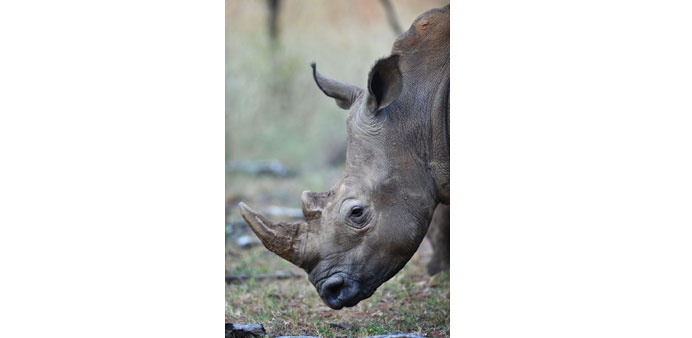DPA/Johannesburg
A South African court has legalised the domestic rhino horn trade, saying a six-year-old ban imposed by the government appeared to have worsened conditions for the endangered animal.
Rhino poaching had soared to “alarming levels” since the 2009 moratorium was imposed, Judge Francis Legodi said in his 37-page judgment after receiving applications from two local game farmers to legalise the trade in rhino horn.
“What disastrous implications would be brought about by the immediate lifting of the moratorium? I cannot think of any,” Legodi said. “In fact the level of rhino poaching since the moratorium is quite alarming.
“In 2008, before the moratorium was imposed, the number of rhino poached was just below 100, in 2009 between 100 and 200, in 2010 just below 400 and in 2011 just below 500.”
The applicants argued that the ban, introduced in 2009, was incapable of achieving its goal of curbing the demand for rhino horn and stemming its flow into the international market.
Furthermore, since the ban went into effect, tax revenue from the previous legal sale of the horn dried up, meaning conservation groups and anti-poaching authorities had less funding to use to ward off poachers.
The judge disagreed with an argument by the environmental affairs minister that lifting the moratorium would cause a flood of rhino poaching and horn smuggling.
John Hume, who runs a farm in the area south of the Kruger National Park, told the court that he could no longer afford to spend 5mn rand ($350,000) a month to preserve his herd of rhinos.
He said he would be forced to dispose of 1,200 rhinos if the ban remained in place.
The moratorium was directly to blame for a sharp spike in rhino poaching since 2008, he said.
The court was told that rhino horn was selling for as much as $65,000 per kilogramme.
Hundreds of South African rhinos are poached each year to meet the large demand for their horn, particularly in Asia, where it is believed to boost sexual potency.
It also used in traditional medicine to cure cancer and other illnesses.
A staggering 1,215 rhinos were slaughtered last year in South Africa, which is, with an estimated 25,000 black and white rhinos, home to the world’s largest population of the animal.
Legalising the trade will help to save the threatened species, Private Rhino Owners Association chair Pelham Jones told DPA in June.
“We clearly see that the trade ban has not diminished poaching in any way. In contrast, it is stimulating the black market trade,” said Jones said at the time.
Rhino horn sales have been banned internationally since 1977.
The legalisation of the domestic trade means that rhino horn purchased by commodity speculators will have to be genetically coded and stored in security vaults until the international trade ban is lifted.
Pro Wildlife, a conservation organisation based in Munich, said the judgment sends “a fatal signal” that could increase poaching.
The allegation that allowing trade in rhino horn would protect the animals is “extremely implausible” and the illegal trade could be fueled by the court’s decision, it said.
There is a great danger that the South African government would buckle to pressure from the rhino owner lobby to push for the legalisation of the international horn trade at the Convention on International Trade in Endangered Species of Wild Fauna and Flora to be held in South Africa in 2016, the organisation said.

This file picture taken on March 12, 2012 shows a white rhinoceros in Limpopo. A South African judge has lifted a domestic ban on trade in rhino horns
